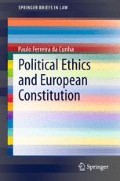Abstract
The European crisis, which began as a financial, then economic and social crisis, is now a political and constitutional one as well. In some countries constitutions are already dead letter at the economic and social levels, and within the superstructure of the European Union, cohesion is thus endangered. The crisis has placed all other issues out of the spotlight. The very question of the European Constitution is invoked only timidly before the imperative of immediate action, and the average European citizen is confronted with bad news everyday since social unrest in Greece or Spain is equally disconcerting for the Germans, the English, or the French—we are all in the same boat: prosperity or ruin is our common fate. It is only a matter of time. There hasn’t been much debate on the European constitutional arrangement in these times when we are practically at war and our energies are spent trying to do triage on immediate emergencies.
Access this chapter
Tax calculation will be finalised at checkout
Purchases are for personal use only
Notes
- 1.
Montoro Ballesteros (1979), and Bigotte Chorão (1986). To oppose democracy to the republic does not seem a good conceptual procedure. If a republic is really very bad in what concerns at least fundamental rights, it wouldn’t be a real republic. If “republic” cannot be “replaced” for a “democracy” everything is wrong, although the concepts are not alike … at least, in today’s conceptualization. Cf., in a controversial perspective, Rousseau (2007); New perspectives, Tzitzis (2012/2013).
- 2.
- 3.
A classic treatise on the public interest question in a legal context is the masterwork of Ehrhardt Soares (1959). It is always important, when we are theorizing politically, not to forget that many of the great concepts of politics have a legal basis, which can be a source of inspiration, in one way or another.
References
Anderheiden, M. (2003). Verfassungsrechtliche Potentiale des Republikprinzips. Berliner Debatte Initial, 14.
Bigotte Chorão, M. (1986). Introdução a Temas Fundamentais de Direito. Coimbra: Almedina.
Ehrhardt Soares, R. (1959). Interesse Público, Legalidade e Mérito. Coimbra: Atlântida.
Ferreira da Cunha, P. (2005). Política Mínima (2nd ed.). Coimbra: Almedina.
Groeschner, R. (2004). § 23. In J. Isensee & P. Kirchhof (Eds.), Handbuch des Staatsrechts der Bundesrepublik Deutschland II, Verfassungsstaat (3rd ed.). Heidelberg: C.F. Mueller.
Koslowski, P. (Ed.). (1999). Das Gemeinwohl zwischen Universalismus und Particularismus zur Theorie des Gemeinwohls und der Gemeinwohlwirkung von Ehescheidung, politischer Sezession und Kirchentrennung. Stuttgart: Frommann-Holzboog.
Montoro Ballesteros, A. (1979). Razones y limites de la legitimación democrática del Derecho. Murcia: Universidad de Murcia.
Rousseau, D. (2007). La V. e République se meurt, vive la démocratie. Paris: Odile Jacob.
Schachtscheiner, K.-A. (1994). Res publica res populi. Grundlegung einer Allgemeinen Republiklehre. Ein Beitrag zur Freiheits-Rechts-und Staatslehre. Berlin: Duncker und Humblot.
Tzitzis, S. (2012/2013). Crise économique, souveraineté populaire et droits sociaux. In: Annuaire Internional des Drois de l´homme (vol. 7, pp. 505 et sq.).
Author information
Authors and Affiliations
Corresponding author
Rights and permissions
Copyright information
© 2015 The Author(s)
About this chapter
Cite this chapter
Ferreira da Cunha, P. (2015). Introduction. In: Political Ethics and European Constitution. SpringerBriefs in Law. Springer, Berlin, Heidelberg. https://doi.org/10.1007/978-3-662-45600-2_1
Download citation
DOI: https://doi.org/10.1007/978-3-662-45600-2_1
Published:
Publisher Name: Springer, Berlin, Heidelberg
Print ISBN: 978-3-662-45599-9
Online ISBN: 978-3-662-45600-2
eBook Packages: Humanities, Social Sciences and LawLaw and Criminology (R0)

